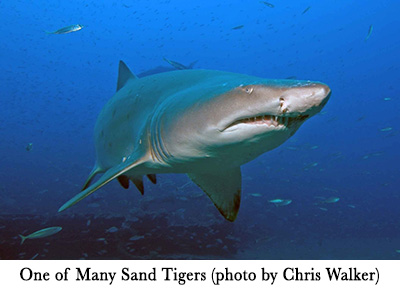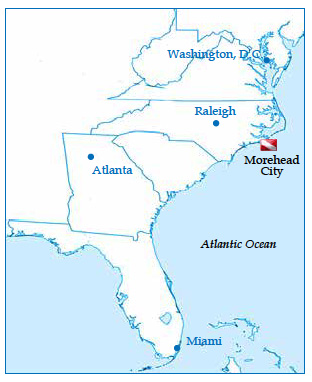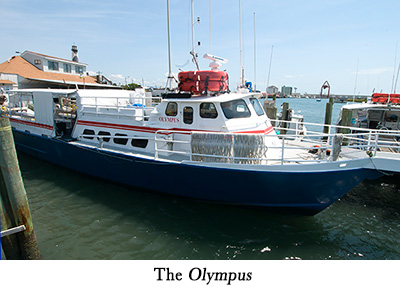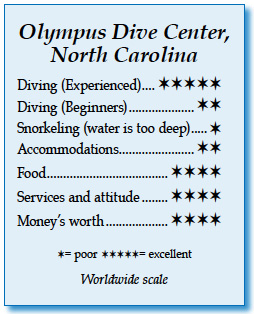Olympus Dive Center, North CarolinaContents of this Issue: Olympus Dive Center, North Carolina Some Divers Really Need to Drop a Few Pounds Siladen Resort and Spa, Indonesia What’s the Craziest Thing You’ve Seen While Diving? Part I: The Ups and Downs of Ocean Currents When It Comes to Diving, Don’t Trust the BBC Was There a Cover-Up in This Diver’s Death? Why Even Air-Breathing Divers Should Analyze Their Tanks Divers and Dolphins: How Much Should They Mix? Shorter Dive Times at Cocos Island? Suunto Finally Settles Its Lawsuit Editorial Office: Ben Davison Publisher and Editor Undercurrent 3020 Bridgeway, Suite 102 Sausalito, CA 94965 sharks and shipwrecks galore, but that tank policy . . . from the October, 2018 issue of Undercurrent
Dear Fellow Diver: It was a picture in a dive magazine -- a bunch of sand tiger sharks hovering above a wreck -- that made me book the trip to a dive destination I'd never heard of. I've been looking for these sharks on multiple dives around the world, but to no avail. I chose the wrong season to go to Mozambique, and the water was too warm in Australia. So I couldn´t quite believe it when I read this picture was taken off the coast of North Carolina, in the Monitor National Marine Sanctuary, which holds the largest graveyard of WWII wrecks in the Atlantic. Living in Germany, I had never heard of it, and I thought the ocean north of Florida would be freezing-water dives. But a check of reader reports on Undercurrent said otherwise, with positive reviews of Olympus Dive Center in Morehead City.
The harbor bridge crossing from Atlantic Beach, where I was staying, was lovely in the early morning light. It was an easy 15-minute drive to Olympus's shop, located at the harbor. I had checked in the day before at the dive shop, which had excellent rental gear, including brand-new Scubapro BCs. I left my gear in the lockable storage lockers aboard the Olympus, a 65-footer aluminum hull with twin Caterpillar diesel engines that holds 24 divers. But no one had told me then about the surprise purchase I had to make. Crew started handing out boarding tickets at 6 a.m. Each ticket has a number, which was always checked before I boarded the boat, then given to one of the crew before entering the boat, and then checked again during the double roll call done right after every dive. When I got my ticket and asked for the tanks, I was told to grab them from the shed next to the shop. But at the shop, they told me, "You need chips for the tank, you have to buy them in the shop." Excuse me? Weren't tanks normally included in the package? Not so at Olympus. So I paid $32, plus tax, for two steel 80s filled with Nitrox. I brought them on board, only to learn, "You still have to analyze these -- back at the shed." No gear for that on board. Fuming, I carried the two steel cylinders back, wondering if this was one of the reasons North Carolina diving was not talked about much. When I checked the gauges, I had 3300 to 3500 psi the first days, later it was often just under 2900 psi. Travis and John, the dive guides, also weren't included in the package -- Olympus charged extra for them to accompany divers. They installed double hang lines underneath the Olympus, with weights and extra tanks, before we started the first dive. They connected these to the anchor line, which Travis took 110 feet down to the USS Schurz, formerly the German cruiser SMS Geier, the only warship captured by the U.S. Navy during World War I, which then sunk a year later after colliding with a freighter. Then they put a red small rope across the wreck for better orientation to find our way back. Travis did this whole job with a full face mask; it looked tough to drag anchor rope with chain across the bottom.
A pod of dolphins escorted us to Spar, a 180-foot-long Coast Guard cutter 30 miles off Morehead City. The water was cooler here, just 73 degrees at the flat, sandy bottom at 108 feet. My buddy, a rebreather diver, touched bottom feet first and nearly landed on top of a sand tiger relaxing underneath him. Thermoclines down at 70 feet made me start shivering in my 5-mil wetsuit, so I vowed to bring my chicken vest with hood for other dives. Fish life here was just as stunning -- huge barracuda, a bunch of jacks and spade fish, thousands of dancing bait fish glimmering in the sunlit waters. It was a two-hour ride each way, with 90-minute surface intervals, and the Olympus docked around 3 p.m. I brought my own snacks, as they only had water, candy and pineapple in the salon below deck. The marine head was at the right of the stairs. The dive deck was huge, but with 24 divers and their gear, it got crowded sometimes. We jumped into the water from either side and boarded via two ladders at the stern. Seas were calm, but crew still helped me take off my fins and steered me to my seat. Travis and John, who look like former Army men, gave detailed safety-oriented boat guidelines and were helpful with every detail. They could never stop calling me "Sir," so I gave up trying to tell them otherwise. Captain Robert gave excellent, thorough dive briefings. He always told us to hold onto the rope until we reached the wreck. North Carolina diving is not like drop-straight-down Caribbean diving. Here, you would drift in a moderate current, as the always-anchored boat can´t immediately pick up divers. After using the freshwater tanks and shower next to the shed, I stored my gear and drove back to Atlantic Beach, a small town stretched along a wide sandy beach across from Morehead. Tourist shops, seafood restaurants and pastel-colored houses greeted me as I drove down the harbor bridge. The Sand Dollar Motel was a modest, unfussy place on the main street, and my air-conditioned room was pleasant. For dinner, I just walked or drove down Henderson Avenue, trying a different seafood place every evening -- Oceana Pier House, Snapperz and Clawson among them -- for excellent, fresh clam chowder, conch fritters, oysters and grilled fish. On my second day, Olympus gave me two black-painted steel 100 tanks; they couldn't find the 80s, but they didn't charge me extra. (They worked excellently, so I asked for and got them on Day 3, but then on my fourth day, they had disappeared and apparently couldn't be found -- what is it with Olympus and its policies on tanks?)
On my wish list was the Caribsea, a cargo ship torpedoed by a German U-boat in 1942, because I had heard up to 20 sand tiger sharks regularly hover there. But Captain Robert said that due to a bunch of dusky sharks assembling there, possibly to mate, it might be too risky. He offered me the U-352 instead. It was impressive, all 220 feet of it, listing to starboard at 110 feet. I poked around the torpedo openings, deck guns, and conning tower with its small open hatch. I wondered, did they use the Seven Dwarfs to operate this boat? I got claustrophobic picturing the 45-man crew packed together like sardines in such a tight space. Now it's home to sea anemones and coral encrusted on the sides, and red barbier baitfish and amberjack swimming densely packed together. Most divers were American, with a few from Asia, Australia and the Netherlands. Ages ranged from teenagers and young couples to oldies like me. The buddies I was paired with were typically experienced guys who regularly dived the Great Lakes and were used to bad visibility. I got a good sense I could rely on them in case of problems. During my 10 dives over five days, I visited seven different wrecks and made three repeat dives. My last day was a shallow-two tank dive, starting at the J.J.F. tugboat. John asked me if I would buddy with a guy diving on air, thinking such a shallow dive at 65 feet wouldn´t be much difference to bottom time with Nitrox, so I agreed. My buddy was young, just out of the Army, had his Advanced Openwater certification, and seemed to be in good shape. He had rented his gear from Olympus, but I found it strange he had no computer, when normally Olympus insisted on that. We planned to meet down where the hang line is connected to anchor rope. I hung there for 10 minutes when he finally arrived, his Hero already filming but his mask totally fogged up. I showed him how to fill and clear his mask, but he did nothing and finned on with his foggy mask. At 35 minutes, he showed me 700 psi, so we slowly ascended.
Fortunately, for my last dive, I was buddied up with an older couple who knew how to use their gear. I didn't expect to see any sand tiger sharks at the Indra, which was fine; I had already received a bounty of sightings and photo ops. Still, rounding the wreck, I saw a school of spadefish come out of one torpedo opening, a lovely stream of silver. Then, inside the superstructure, grey shadows loomed. Sand tigers, between six and ten feet long. I stayed still, and the guys came over, close enough to touch. I got the best shots and footage of the whole trip. As I ascended, I looked down to see baitfish being chased by amberjack above the wreck and saluted my farewell to this majestic graveyard and marine sanctuary. Back on the boat, my dive buddies kindly praised my skills and grace on the dives, but I couldn't return the compliment to Olympus. It was a lovely five days of spectacular fish life, and of course, finally seeing my longed-for sand tigers. For experienced, self-reliant and adventurous divers who are comfortable in bad visibility, thermoclines and tight-quarter wreck dives, it's a great experience. But Olympus definitely needs to do a better job of making sure all divers are qualified and capable enough for its trips. And for God's sake, just include the price of your tanks in the total package. -- M.J. Our Undercover Diver's Bio: "Diving since 1974, I've made more than 2,200 dives in more than 100 destinations worldwide. I'm always looking for special destinations that have 'icing on the cake' dives like Phoenix Island, Kiribati, Rowley Shoals, Djibouti and New Calendonia. I'm still dreaming of visiting Bikini Atoll and Yemen."
|

I want to get all the stories! Tell me how I can become an Undercurrent Online Member and get online access to all the articles of Undercurrent as well as thousands of first hand reports on dive operations world-wide
| Home | Online Members Area | My Account |
Login
|
Join
|
| Travel Index |
Dive Resort & Liveaboard Reviews
|
Featured Reports
|
Recent
Issues
|
Back Issues
|
|
Dive Gear
Index
|
Health/Safety Index
|
Environment & Misc.
Index
|
Seasonal Planner
|
Blogs
|
Free Articles
|
Book Picks
|
News
|
|
Special Offers
|
RSS
|
FAQ
|
About Us
|
Contact Us
|
Links
|
3020 Bridgeway, Ste 102, Sausalito, Ca 94965
All rights reserved.

 Olympus gave me the usual forewarnings: book early
because the boat was filling up fast on my July dates, and
while sand tigers are normally around, it's nature and they
couldn't promise anything. I paid for four full-day and one
half-day trips, booked a flight to Raleigh via Miami and a
rental car for the four-hour drive to Morehead City.
Olympus gave me the usual forewarnings: book early
because the boat was filling up fast on my July dates, and
while sand tigers are normally around, it's nature and they
couldn't promise anything. I paid for four full-day and one
half-day trips, booked a flight to Raleigh via Miami and a
rental car for the four-hour drive to Morehead City. Bait fish hovered above the wreck, a dense cloud so thick, I couldn´t see the
wreck below as I descended in 78-degree water. As the cloud cleared, I immediately
found the view I had waited so long for -- two 10-foot-long sand tigers circled slowly
above the Schurz. Whoooaaahh. Their three rows of razor-sharp chompers protrude even
with mouths closed, but these docile creatures actually looked cute, and they certainly
weren't shy as they swam alongside us. I don´t know how many shots I took with my
GoPro Hero in the first minute, but with 70-foot visibility in the emerald-green water,
they were generally good ones. Nearly all of us were diving Nitrox, with a bottom time
of 25 minutes. Time passed too fast -- I could have stayed longer to watch the streams
of yellowfin tuna, barracuda and big stingrays sailing past.
Bait fish hovered above the wreck, a dense cloud so thick, I couldn´t see the
wreck below as I descended in 78-degree water. As the cloud cleared, I immediately
found the view I had waited so long for -- two 10-foot-long sand tigers circled slowly
above the Schurz. Whoooaaahh. Their three rows of razor-sharp chompers protrude even
with mouths closed, but these docile creatures actually looked cute, and they certainly
weren't shy as they swam alongside us. I don´t know how many shots I took with my
GoPro Hero in the first minute, but with 70-foot visibility in the emerald-green water,
they were generally good ones. Nearly all of us were diving Nitrox, with a bottom time
of 25 minutes. Time passed too fast -- I could have stayed longer to watch the streams
of yellowfin tuna, barracuda and big stingrays sailing past. Groupers lounged in the sand at the bow keel of the Indra, a 328-foot repair ship
that took two direct hits in Vietnam. Underneath the superstructure, I spotted three
sand tigers cruising inside the hold. I held my breath as one swam by, close enough to
touch, so I wouldn't scare him with my bubbles. I got a great shot from the shark's
underside, a close-up of its open mouth with rows of sharp teeth.
Groupers lounged in the sand at the bow keel of the Indra, a 328-foot repair ship
that took two direct hits in Vietnam. Underneath the superstructure, I spotted three
sand tigers cruising inside the hold. I held my breath as one swam by, close enough to
touch, so I wouldn't scare him with my bubbles. I got a great shot from the shark's
underside, a close-up of its open mouth with rows of sharp teeth. Immediately after climbing on board, he threw up several times. I asked if he
had tried to save air and now had a bad headache. Nope, he confessed, he had partied
heavily the night before, drinking into the wee hours. The worst thing: He had done
only 12 dives, none of them in the past three years. I was pissed. How could Olympus
allow such a guy on these dives? They had obviously checked his credit card, but had
they looked at his filled-out form, and asked about his former dives and not using a
computer? Totally irresponsible. Any ideas I had for tipping went down the drain. How
dare they give any diver such a buddy while giving the same dive safety lecture every
day about the self-reliance we must have for our own diving issues.
Immediately after climbing on board, he threw up several times. I asked if he
had tried to save air and now had a bad headache. Nope, he confessed, he had partied
heavily the night before, drinking into the wee hours. The worst thing: He had done
only 12 dives, none of them in the past three years. I was pissed. How could Olympus
allow such a guy on these dives? They had obviously checked his credit card, but had
they looked at his filled-out form, and asked about his former dives and not using a
computer? Totally irresponsible. Any ideas I had for tipping went down the drain. How
dare they give any diver such a buddy while giving the same dive safety lecture every
day about the self-reliance we must have for our own diving issues. Divers Compass: For my five days of diving, Olympus charged $645, not
including the $32 each day for two tanks . . . Hurricane Florence
severely affected towns on North Carolina's coast, but as of press
time, Olympus is repairing its docks, running its shop on limited
electricity, and started taking trips out again at the end of
September . . . Sand Dollar Motel standard rooms start at $70, efficiency
rooms with full kitchens start at $85, and all rooms have free
WiFi, but Hurricane Florence has closed it through mid-November . .
. Websites: Olympus Dive Center -
Divers Compass: For my five days of diving, Olympus charged $645, not
including the $32 each day for two tanks . . . Hurricane Florence
severely affected towns on North Carolina's coast, but as of press
time, Olympus is repairing its docks, running its shop on limited
electricity, and started taking trips out again at the end of
September . . . Sand Dollar Motel standard rooms start at $70, efficiency
rooms with full kitchens start at $85, and all rooms have free
WiFi, but Hurricane Florence has closed it through mid-November . .
. Websites: Olympus Dive Center - 